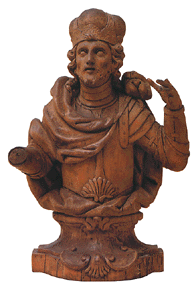Good King Wenceslas
 There are some juicy feasts this week - and today's is one of the most intriguing. We all know 'Good King Wenceslas' from the Christmas carol, but this has more to do with John Mason Neale (who wrote the lyrics) than the saint himself. In fact, St Wenceslas has very little to do with Christmas and seems a rather obscure subject for a carol.
There are some juicy feasts this week - and today's is one of the most intriguing. We all know 'Good King Wenceslas' from the Christmas carol, but this has more to do with John Mason Neale (who wrote the lyrics) than the saint himself. In fact, St Wenceslas has very little to do with Christmas and seems a rather obscure subject for a carol.He was born around 907 in the castle of Stochov near Prague. The castle no longer exists but an oak tree still stands, which was said to have been planted by his influential grandmother, St Ludmila, to mark his birth and was watered by the baby's bath water.
Christianity was still relatively new to Bohemia when St Wenceslas became Duke in 921 - SS Cyril and Methodius had planted the Gospel there just over half a century previously. However, there were strong anti-Christian forces, including his mother, Drahomira, who became regent on the death of his father (the saint was aged only 14). Wenceslas gained power thanks to a coup in 922 and his mother was banished. He formed links between Bohemia and the Holy Roman Emperor, defended the Church and (as suggested by the carol) gave alms to the poor.
Drahomira was not the only unpleasant member of his family. His brother, Boleslas, was busy trying to expand his power base, especially after Wenceslas married and produced an heir. On 27 September 929 Boleslas invited the saint to celebrate the Feast of SS Cosmas and Damian (now on 26 September) at Stara Boleslav and, the following morning, killed him outside the church, just after Matins. His dying words were 'Brother, may God forgive you.'
Yet St Wenceslas is remembered more for his good works than his martyrdom:
Therefore, Christian men, be sure, wealth or rank possessing,
Ye who now will bless the poor, shall yourselves find blessing.
Ye who now will bless the poor, shall yourselves find blessing.



0 Comments:
Post a Comment
<< Home